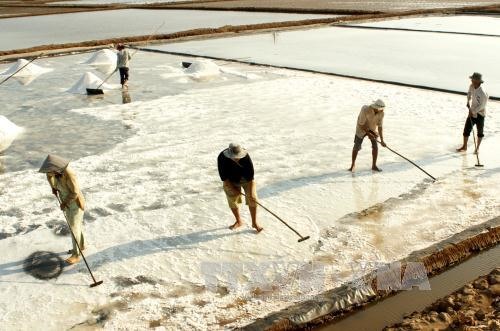 Society
Society

The salt price in the Cửu Long (Mekong) Delta province of Bạc Liêu has increased two to three times compared to last year, according to local farmers.
 |
| Farmers in the Cửu Long (Mekong) Delta province of Bạc Liêu harvest salt. — VNA/VNS Photo Huỳnh Sử |
BẠC LIÊU – The salt price in the Cửu Long (Mekong) Delta province of Bạc Liêu has increased two to three times compared to last year, according to local farmers.
Nguyễn Hoàng Thưa, deputy chairman of the Doanh Điền Hamlet Salt Cooperative in Đông Hải District’s Điền Hải commune, said the price of low-quality salt had risen to more than VNĐ1,000 ($ 0.05) per kilo from VNĐ500 (US$ 0.02) per kilo at the end of last year’s salt season.
The price for high-quality salt has risen to more than VNĐ 1,500($ 0.07) per kilo, he said.
The province’s salt farmers have begun harvesting the 2016-17 salt crop. Because of unseasonable rains, this year’s salt season occurred two months later than usual.
Võ Hoàng Nghiệp, director of the Doanh Điền Hamlet Salt Co-operative, said that because of the higher prices, all of the 70 hectares of the co-operative’s salt fields would be used to produce salt this year.
However, despite the high prices, the province has been encouraging salt farmers to cultivate high-value crops and animals on inefficient salt-production areas.
Nguyễn Quốc Hùng, head of the Đông Hải District’s Agriculture and Rural Development Bureau, said the district would continue to transfer a part of the inefficient salt production areas to aquaculture and Artemia (brine shrimp) farming.
Brine shrimp farming has developed in the district for several years, bringing more benefits than salt production.
But the shift has been slow because farmers lack proficient techniques. Inadequate investment in proper facilities and slow technology transfer have also contributed to the sluggish pace.
Đông Hải District is the province’s largest salt production area.
Bạc Liêu will shift about 500ha of salt to Artemia farming from now to 2020, according to the province’s Department of Agriculture and Rural Development.
The province plans to encourage farmers to switch from producing low-quality salt to high-quality salt, and increase mechanisation and use of advanced technology.
It will also promote the establishment of co-operatives and co-operative teams to help salt farmers produce and sell salt.
In addition, favourable conditions for individuals and organisations will be created to access loans for investment in new technology for salt production.
Bạc Liêu, which is one of the country’s largest salt producers, has about 2,300 hectares of salt fields.
In the 2015-16 salt season, the province produced more than 165,000 tonnes. — VNS




